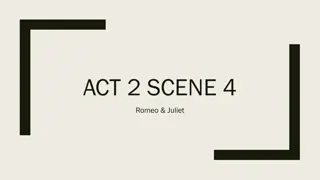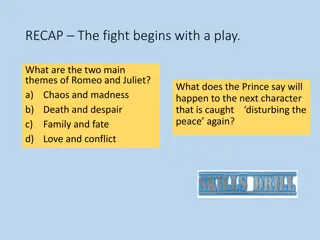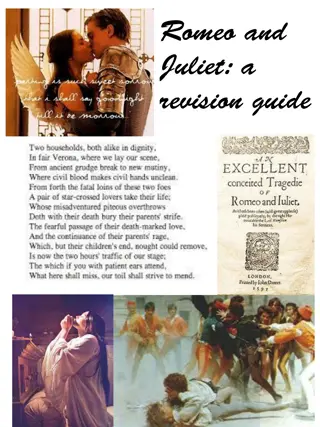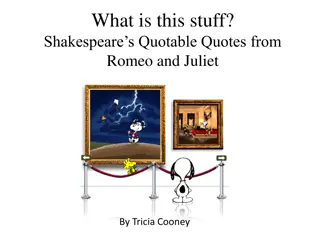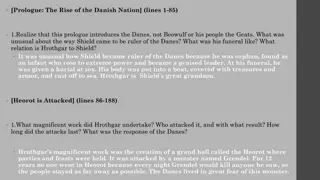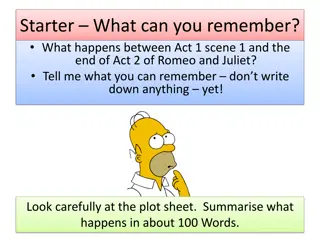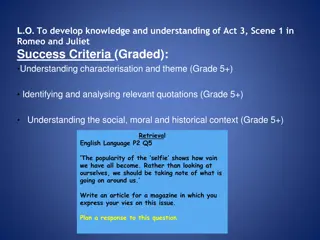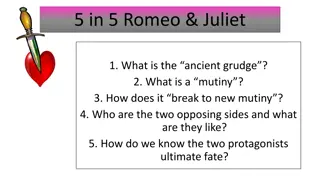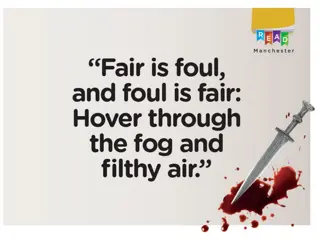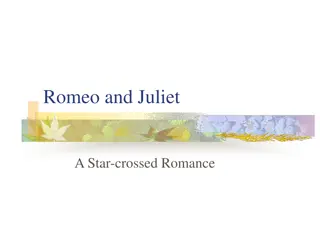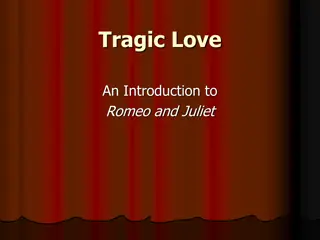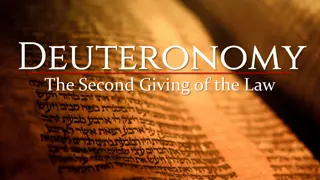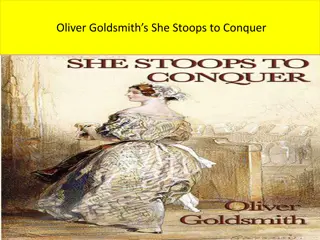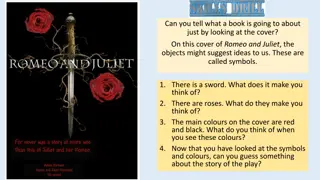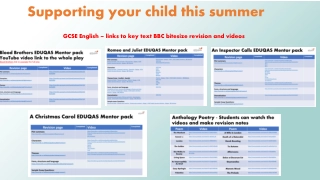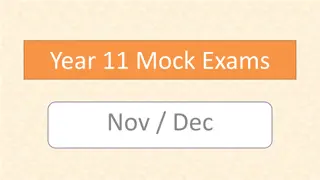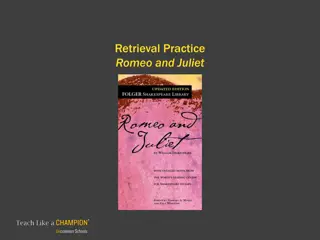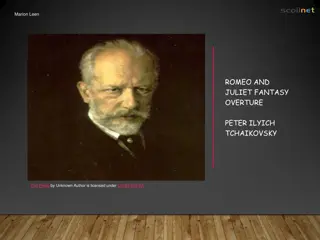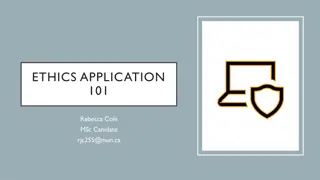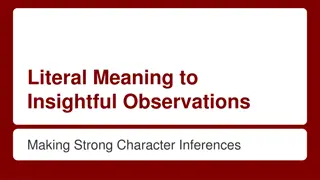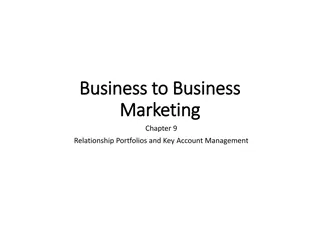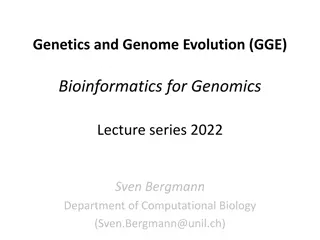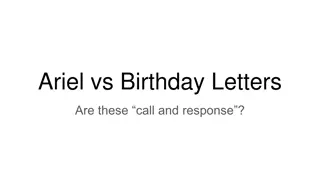Analysis of Romeo and Juliet's Relationship in the Prologue
The Prologue of Romeo and Juliet sets the stage in fair Verona where two noble families, the Montagues and Capulets, are engaged in a long-standing feud. Amidst this conflict, the tragic love story of Romeo and Juliet unfolds, marked by themes of love, hate, and fate. Shakespeare's use of contrasting language and vivid imagery hints at the intense emotions and struggles that will shape the course of the play.
- Romeo and Juliet
- Prologue analysis
- Relationship presentation
- Shakespearean drama
- Conflict resolution
Download Presentation

Please find below an Image/Link to download the presentation.
The content on the website is provided AS IS for your information and personal use only. It may not be sold, licensed, or shared on other websites without obtaining consent from the author. Download presentation by click this link. If you encounter any issues during the download, it is possible that the publisher has removed the file from their server.
E N D
Presentation Transcript
Were going to look at the Prologue in some detail. I want you to make notes on what I talk about. If you have any ideas of your own, please feel free to share them. Remember, the big question needs to be: How is Romeo and Juliet s relationship presented?
The Prologue A prologue is something which comes before the main story, which details the setting and gives any necessary background information. It usually establishes the main theme and mood of the story. The use of prologues dates back to Ancient Greek drama, where they were used to help the audience understand everything which followed. Further, Shakespeare s audience at the original Globe theatre were prone to rioting: it was essential to make them interested early on.
The Prologue Two households, both alike in dignity, In fair Verona, where we lay our scene, From ancient grudge break to new mutiny, Where civil blood makes civil hands unclean. From forth the fatal loins of these two foes A pair of star-cross'd lovers take their life; Whose misadventured piteous overthrows Do with their death bury their parents' strife. The fearful passage of their death-mark'd love, And the continuance of their parents' rage, Which, but their children's end, nought could remove, Is now the two hours' traffic of our stage; The which if you with patient ears attend, What here shall miss, our toil shall strive to mend.
The first quatrain (four-line unit of poetry) Two households, both alike in dignity, In fair Verona, where we lay our scene, From ancient grudge break to new mutiny, Where civil blood makes civil hands unclean. There are two families who have equal social status, and they live in Verona a city in Italy which is where the play is set. They ve had an argument or feud going on for a long time, and recently it has broken into a new round of fighting. Civilians have been killing other civilians.
The first quatrain (four-line unit of poetry) Two households, both alike in dignity, In fair Verona, where we lay our scene, From ancient grudge break to new mutiny, Where civil blood makes civil hands unclean. The very first bit of language Shakespeare exposes his audience to, before we even meet the characters, is quite violent and aggressive: he talks of fighting and death. This suggests that hate will be an important theme. It comes before any discussion of love; perhaps it is more important. Shakespeare also includes antithesis completely opposite ideas early on. Perhaps the Prologue is suggesting that opposition and conflict will be important themes. The words in the Prologue clash, just as the families clash, and individual characters clash. AO2 explain how language, structure and form contribute to writers presentation of ideas, themes and settings.
The second quatrain From forth the fatal loins of these two foes A pair of star-cross'd lovers take their life; Whose misadventured piteous overthrows Do with their death bury their parents' strife. The children of these two families fall in love and kill themselves. Their bad luck and their sad story is what puts an end to their parents arguments.
The second quatrain From forth the fatal loins of these two foes A pair of star-cross'd lovers take their life; Whose misadventured piteous overthrows Do with their death bury their parents' strife. Shakespeare continues his presentation of violent and aggressive language: here he talks of arguments, death, and general bad luck. There have been numerous references to hate so far, and lovers have only been referred to once: perhaps Shakespeare is more concerned with hate than with love. The first time we do hear of lovers we learn that they are star-cross d , which means that their story is determined by fate: they cannot escape it. The repetition of the f sound alliteration draws attention to this line and makes it clear that this is an important aspect: the story is about the children of these great enemies, and the audience should remember that. AO2 explain how language, structure and form contribute to writers presentation of ideas, themes and settings.
The third quatrain The fearful passage of their death-mark'd love, And the continuance of their parents' rage, Which, but their children's end, nought could remove, Is now the two hours' traffic of our stage; The story of their doomed love, and of their parents arguments which couldn t have ended if it weren t for their children dying is what you ll see acted out on stage over the next couple of hours.
The third quatrain The fearful passage of their death-mark'd love, And the continuance of their parents' rage, Which, but their children's end, nought could remove, Is now the two hours' traffic of our stage; The phrase death-mark dlove is an example of juxtaposition, when two things are placed next to each other for effect. Shakespeare places the idea of death right next to the idea of love : perhaps he thinks that the two are very closely related. Qs: 1) Is there a reason why death comes before love in the phrase? 2) Is he talking generally, or about R&J specifically? AO2 explain how language, structure and form contribute to writers presentation of ideas, themes and settings.
The rhyming couplet The which if you with patient ears attend, What here shall miss, our toil shall strive to mend. If you listen carefully, what we ve missed out here we ll try to fill you in on whilst we act out the play.
The structure The poem is a sonnet it contains 14 lines. For hundreds of years since Petrarch and the Italian renaissance sonnets had chiefly been about love. grudge, mutiny, blood, unclean, fatal, foes, death, strife, rage Shakespeare writes more of hate and violence than he does of love. The audience at the time would have known that sonnets were typically about love, and would have been surprised at how Shakespeare took this form of love poetry and made it violent. He may have been challenging their expectations to make them realise that love stories cannot be predicted perhaps he felt that love was shocking and unusual, and so made his poetry the same. AO4 relate texts to their social, cultural and historical contexts; explain how texts have been influential and significant to self and other readers in different contexts and at different times.
Extension questions on The Prologue If you attempt any of the following you must always consider the ways in which Romeo and Juliet s relationship is portrayed. The form (sonnet) and the language clash: why might Shakespeare have done this? The rhyme-scheme is traditional and predictable: why might Shakespeare have done this? (ABABCDCDEFEFGG Shakespearean sonnet) Why does Shakespeare tell us the key bits of the storyline before we watch/read the play? Shakespeare makes it clear that it s a play he refers to the stage etc. what might be the purpose of reminding the audience of this? Do you think the Prologue is an effective introduction to the play?
Knowledge: Romeo is sad about the love he has for Rosaline, who doesn t love him back Skills: Watch several versions. Act it out. Try to empathisewith Romeo s emotions. Understanding: Notes on the key scene from the play.
Have your hand-out of Romeos early view of love : make any notes you feel would help! BENVOLIO Good-morrow, cousin. ROMEO Is the day so young? BENVOLIO But new struck nine. ROMEO Ay me! sad hours seem long. Was that my father that went hence so fast? BENVOLIO It was. What sadness lengthens Romeo's hours? ROMEO Not having that, which, having, makes them short. BENVOLIO In love? ROMEO Out-- BENVOLIO Of love? ROMEO Out of her favour, where I am in love. Romeo tells his cousin, Benvolio, that he is sad because the girl he loves does not love him back. This sadness is making time pass very slowly for Romeo: sad hours seem long. He also feels that if he were in love, the opposite would be true, and time would pass too quickly: that, which having, makes them short.
Have your hand-out of Romeos early view of love : make any notes you feel would help! BENVOLIO Good-morrow, cousin. ROMEO Is the day so young? BENVOLIO But new struck nine. ROMEO Ay me! sad hours seem long. Was that my father that went hence so fast? BENVOLIO It was. What sadness lengthens Romeo's hours? ROMEO Not having that, which, having, makes them short. BENVOLIO In love? ROMEO Out-- BENVOLIO Of love? ROMEO Out of her favour, where I am in love. Romeo tries to avoid talking about it: he tries to change the topic by asking of his father, and he replies Out when asked if he is in love, which is not really answering honestly. Clearly, at this early stage, Romeo views love as something which can cause great pain.
Have your hand-out of Romeos early view of love : make any notes you feel would help! Romeo questions Benvolio about the earlier fight, but says he has heard it all before. Shakespeare could be saying that hatred and violence are repetitive and predictable. Romeo O me! What fray was here? Yet tell me not, for I have heard it all. Here's much to do with hate, but more with love. Why, then, O brawling love! O loving hate! O any thing, of nothing first create! O heavy lightness! serious vanity! Mis-shapen chaos of well-seeming forms! Feather of lead, bright smoke, cold fire, sick health! Still-waking sleep, that is not what it is! This love feel I, that feel no love in this. He then lists a series of impossible, self- contradictory concepts, showing how confused he feels.
Have your hand-out of Romeos early view of love : make any notes you feel would help! An oxymoron is something that contradicts itself, like accidentally on purpose . Romeo O me! What fray was here? Yet tell me not, for I have heard it all. Here's much to do with hate, but more with love. Why, then, O brawling love! O loving hate! O any thing, of nothing first create! O heavy lightness! serious vanity! Mis-shapen chaos of well-seeming forms! Feather of lead, bright smoke, cold fire, sick health! Still-waking sleep, that is not what it is! This love feel I, that feel no love in this. Romeo uses plenty here: O loving hate!...cold fire, sick health! Shakespeare is using self- contradictory language to show that Romeo s world doesn t make sense to him. Just like in the Prologue, the ideas of good and bad of love and hate are completely inseparable. Romeo s unrequited love has left him feeling confused and depressed. AO2 explain how language, structure and form contribute to writers presentation of ideas, themes and settings.
Have your hand-out of Romeos early view of love : make any notes you feel would help! Romeo goes on to describe this unrequited love further. Romeo Griefs of mine own lie heavy in my breast, Love is a smoke raised with the fume of sighs; Being purged, a fire sparkling in lovers' eyes; Being vex'd a sea nourish'd with lovers' tears: What is it else? a madness most discreet, A choking gall and a preserving sweet. He calls it a fire a source of damage and pain. He calls it a sea nourish d with lovers tears showing the extent of his sadness. He calls it a madness and a gall (poison). These metaphors all show how harmful he feels love can be. AO2 explain how language, structure and form contribute to writers presentation of ideas, themes and settings.
BENVOLIO Tell me in sadness, who is that you love. ROMEO In sadness, cousin, I do love a woman. BENVOLIO I aim'd so near, when I supposed you loved. ROMEO A right good mark-man! And she's fair I love. BENVOLIO A right fair mark, fair coz, is soonest hit. ROMEO Well, in that hit you miss: she'll not be hit With Cupid's arrow; she hath Dian's wit; And, in strong proof of chastity well arm'd, From love's weak childish bow she lives unharm'd. She will not stay the siege of loving terms, Nor bide the encounter of assailing eyes, Nor ope her lap to saint-seducing gold: O, she is rich in beauty, only poor, That when she dies with beauty dies her store. Benvolio asks who Romeo is in love with and Romeo again tries to avoid answering clearly: I do love a woman. The pair introduce a metaphor of women being hit by love, and Romeo goes on to explain to Benvolio that the woman he loves has sworn to live a life of chastity: she has vowed to abstain from having sex. Romeo clearly feels upset that she has made this decision. He suggests that it is a shame that when she dies, her beauty will die with her, un-enjoyed.
BENVOLIO Tell me in sadness, who is that you love. ROMEO In sadness, cousin, I do love a woman. BENVOLIO I aim'd so near, when I supposed you loved. ROMEO A right good mark-man! And she's fair I love. BENVOLIO A right fair mark, fair coz, is soonest hit. ROMEO Well, in that hit you miss: she'll not be hit With Cupid's arrow; she hath Dian's wit; And, in strong proof of chastity well arm'd, From love's weak childish bow she lives unharm'd. She will not stay the siege of loving terms, Nor bide the encounter of assailing eyes, Nor ope her lap to saint-seducing gold: O, she is rich in beauty, only poor, That when she dies with beauty dies her store. Romeo uses a lot of military language to describe his affection . hit, arrow, well arm d, bow, siege, assailing Clearly, Romeo views love as a battle. He also views it as something a man does to a woman: there is little said, at this stage, of any intimate, personal connection between two lovers. He just wants to win the battle that is love. AO2 explain how language, structure and form contribute to writers presentation of ideas, themes and settings.
February 20th 2017 Romeo s Early Views on Love Explain how Romeo feels when he talks about loving Rosaline. Show us that at first Romeo feels sad and upset. Go on to explain how Romeo ends up feeling angry and violent. Make sure you include quotations and say what type of language Shakespeare uses.
Romeos early view of love Does Romeo really love this woman we hear of in Act 1 Scene 1 (Rosaline)? Does his obsession with another woman change the way the audience feel about his later love for Juliet? What is it that Romeo is looking for is it true love or something else? Why do you think Shakespeare makes Romeo use violent, military terms? Is he telling us that love is violent, or simply that silly young boys believe it to be a battle? Benvolio promises to change Romeo s mind and show him other women to love. Is this Shakespeare preparing us for later developments? Would Shakespeare s original audience have held different views of chastity than would a modern audience? Why is this important?
In what ways is a person similar to a book?
Were going to look at a scene where Juliet hears of Paris. I want you to make notes on what I talk about. If you have any ideas of your own, please feel free to share them. Remember, the big question needs to be: How is Romeo and Juliet s relationship presented?
Juliets early view of love Before meeting Romeo, Juliet makes clear that she is not particularly inclined to get married. This shows she is different to Romeo, who seems desperate to be in love. LADY CAPULET Tell me, daughter Juliet, How stands your disposition to be married? JULIET It is an honour that I dream not of. LADY CAPULET Well, think of marriage now; younger than you, Here in Verona, ladies of esteem, Are made already mothers: by my count, I was your mother much upon these years That you are now a maid. Thus then in brief: The valiant Paris seeks you for his love. Juliet s mother suggests that, as Juliet s 14th birthday is within a matter of weeks, it is about time she settled down and found a husband. She says that many girls her age are already mothers. Is it right to do something just because other people in society are doing it? Would a modern audience react differently to this to a contemporary one? AO4 relate texts to their social, cultural and historical contexts; explain how texts have been influential and significant to self and other readers in different contexts and at different times.
An extended metaphor: a book LADY CAPULET Verona's summer hath not such a flower. What say you? can you love the gentleman? This night you shall behold him at our feast; Read o'er the volume of young Paris' face, And find delight writ there with beauty's pen; Examine every married lineament, And see how one another lends content And what obscured in this fair volume lies Find written in the margent of his eyes. This precious book of love, this unbound lover, To beautify him, only lacks a cover: The fish lives in the sea, and 'tis much pride For fair without the fair within to hide: That book in many's eyes doth share the glory, That in gold clasps locks in the golden story; So shall you share all that he doth possess, By having him, making yourself no less. Nurse No less! nay, bigger; women grow by men. Juliet s mother talks to Juliet of Paris as though he were a book. She says Juliet, if she looks, will find delight writ there with beauty s pen , meaning he is handsome. She says she should look for that obscured in this fair volume , meaning he has hidden depths. She also says that this unbound lover only lacks a cover which suggests that Juliet s purpose would be to be pretty whilst he was intelligent etc. What does this imply about the perceived role of women as wives in Shakespeare s times?
An extended metaphor: a book LADY CAPULET Verona's summer hath not such a flower. What say you? can you love the gentleman? This night you shall behold him at our feast; Read o'er the volume of young Paris' face, And find delight writ there with beauty's pen; Examine every married lineament, And see how one another lends content And what obscured in this fair volume lies Find written in the margent of his eyes. This precious book of love, this unbound lover, To beautify him, only lacks a cover: The fish lives in the sea, and 'tis much pride For fair without the fair within to hide: That book in many's eyes doth share the glory, That in gold clasps locks in the golden story; So shall you share all that he doth possess, By having him, making yourself no less. Nurse No less! nay, bigger; women grow by men. When Juliet s mother says so shall you share all that he doth possess , does that strike you as a romantic reason to get married? Do many couples nowadays marry for financial reasons, do you think? Juliet s nurse goes on to say that women grow by men. Do you think it is true that marrying a man makes a woman better? Is Juliet s mother making an argument that would have convinced Shakespearean girls to marry? Would it work nowadays? AO3 relate texts to their social, cultural and historical contexts; explain how texts have been influential and significant to self and other readers in different contexts and at different times.
Juliets reaction Despite the best efforts of Juliet s mother to convince her to marry Paris, Juliet still doesn t seem overly keen on the idea. LADY CAPULET Speak briefly, can you like of Paris' love? JULIET I'll look to like, if looking liking move: But no more deep will I endart mine eye Than your consent gives strength to make it fly. Does this alter your understanding of how passionately she must feel for Romeo? At first, she seems disinterested in marriage, but upon meeting him, she can t wait!
Were going to look at the first part of the ball scene. I want you to make notes on what I talk about. If you have any ideas of your own, please feel free to share them. Remember, the big question needs to be: How is Romeo and Juliet s relationship presented?
Romeo spots Juliet ROMEO [To a Servingman] What lady is that, which doth enrich the hand Of yonder knight? Servant I know not, sir. ROMEO O, she doth teach the torches to burn bright! It seems she hangs upon the cheek of night Like a rich jewel in an Ethiope's ear; Beauty too rich for use, for earth too dear! So shows a snowy dove trooping with crows, As yonder lady o'er her fellows shows. The measure done, I'll watch her place of stand, And, touching hers, make blessed my rude hand. Did my heart love till now? forswear it, sight! For I ne'er saw true beauty till this night. The first time Romeo sees Juliet, he speaks very highly of her. He suggests that she makes men better: doth enrich the hand of yonder knight and uses general courtly language to speak of her. Gone is the aggressive, militant Romeo of earlier. Now he swears he has saw true beauty .
and Tybalt spots Romeo! TYBALT This, by his voice, should be a Montague. Fetch me my rapier, boy. What dares the slave Come hither, cover'd with an antic face, To fleer and scorn at our solemnity? Now, by the stock and honour of my kin, To strike him dead, I hold it not a sin. CAPULET Why, how now, kinsman! wherefore storm you so? TYBALT Uncle, this is a Montague, our foe, A villain that is hither come in spite, To scorn at our solemnity this night. CAPULET Young Romeo is it? TYBALT 'Tis he, that villain Romeo. Tybalt Juliet s cousin sees Romeo at the Capulet ball and can hardly contain his rage. Tybalt, as a character, personifies the hatred and violence that plagues the play. When first we meet him, he tells us that he hates the word (peace) and throughout the play he does nothing but fuel the anger and resentment between the two families.
and Tybalt spots Romeo! CAPULET Content thee, gentle coz, let him alone; I would not for the wealth of all the town Here in my house do him disparagement: TYBALT It fits, when such a villain is a guest: I'll not endure him. CAPULET He shall be endured: What, goodman boy! I say, he shall: go to; Am I the master here, or you? go to. TYBALT I will withdraw: but this intrusion shall Now seeming sweet convert to bitter gall. The only thing that stops Tybalt fighting Romeo on the spot is Capulet s sense of pride: he will not have his party ruined. The society of the time is displayed here the man is the head of the household and Tybalt, despite his rage, must do as he is told. Tybalt ends by saying this intrusion shall now seeming sweet convert to bitter gall. Gall means poison, and this section of the play foreshadows Romeo s eventual death by poison.
How is the play structured? ROMEO Did my heart love till now? forswear it, sight! For I ne'er saw true beauty till this night. Very quickly the tone changes: the audience at once sees Romeo (apparently) falling in love, but then straight away we see Tybalt promising death to Romeo. As an audience because of the Prologue we know Romeo is destined to die. Is it possible for the audience to be happy for him and his new-found beauty ? Why might Shakespeare move from the language of love to the language of hate so swiftly, in one scene? What does that suggest about how love and hate are being portrayed? TYBALT I will withdraw: but this intrusion shall Now seeming sweet convert to bitter gall. AO2 explain how language, structure and form contribute to writers presentation of ideas, themes and settings.
Were going to look at the lovers first meeting. I want you to make notes on what I talk about. If you have any ideas of your own, please feel free to share them. Remember, the big question needs to be: How is Romeo and Juliet s relationship presented?
A quick recap What do we know about Romeo and Juliet the characters so far? What are their opinions on, and attitudes towards, love? What are their families opinions towards each other?
The first meeting: a sonnet ROMEO If I profane with my unworthiest hand This holy shrine, the gentle fine is this: My lips, two blushing pilgrims, ready stand To smooth that rough touch with a tender kiss. JULIET Good pilgrim, you do wrong your hand too much, Which mannerly devotion shows in this; For saints have hands that pilgrims' hands do touch, And palm to palm is holy palmers' kiss. ROMEO Have not saints lips, and holy palmers too? JULIET Ay, pilgrim, lips that they must use in prayer. ROMEO O, then, dear saint, let lips do what hands do; They pray, grant thou, lest faith turn to despair. JULIET Saints do not move, though grant for prayers' sake. ROMEO Then move not, while my prayer's effect I take. Unlike the Prologue, this is a much more typical Shakespearean sonnet. Using a sonnet in this traditional way is one of Shakespeare s ways of hinting that their love is real .
The first meeting: a sonnet ROMEO If I profane with my unworthiest hand This holy shrine, the gentle fine is this: My lips, two blushing pilgrims, ready stand To smooth that rough touch with a tender kiss. JULIET Good pilgrim, you do wrong your hand too much, Which mannerly devotion shows in this; For saints have hands that pilgrims' hands do touch, And palm to palm is holy palmers' kiss. ROMEO Have not saints lips, and holy palmers too? JULIET Ay, pilgrim, lips that they must use in prayer. ROMEO O, then, dear saint, let lips do what hands do; They pray, grant thou, lest faith turn to despair. JULIET Saints do not move, though grant for prayers' sake. ROMEO Then move not, while my prayer's effect I take. We have three quatrains, and then a rhyming couplet. Consider the distribution of the lines: who is speaking in each of these four units? What might that tell us about love? AO2 explain how language, structure and form contribute to writers presentation of ideas, themes and settings.
The first meeting: a sonnet ROMEO If I profane with my unworthiest hand This holy shrine, the gentle fine is this: My lips, two blushing pilgrims, ready stand To smooth that rough touch with a tender kiss. JULIET Good pilgrim, you do wrong your hand too much, Which mannerly devotion shows in this; For saints have hands that pilgrims' hands do touch, And palm to palm is holy palmers' kiss. ROMEO Have not saints lips, and holy palmers too? JULIET Ay, pilgrim, lips that they must use in prayer. ROMEO O, then, dear saint, let lips do what hands do; They pray, grant thou, lest faith turn to despair. JULIET Saints do not move, though grant for prayers' sake. ROMEO Then move not, while my prayer's effect I take. We have another extended metaphor: Romeo talks as though Juliet were some Holy shrine, and his lips are pilgrims visiting it. This is a courtly version of flirting, and Juliet is quick to join in! AO2 explain how language, structure and form contribute to writers presentation of ideas, themes and settings.
The first meeting: a sonnet Here it is interesting to note that they refer to their coming together in terms of sin they are not to know of the harm that s caused, but they re more right than they know. ROMEO Thus from my lips, by yours, my sin is purged. JULIET Then have my lips the sin that they have took. ROMEO Sin from thy lips? O trespass sweetly urged! Give me my sin again. JULIET You kiss by the book. It s also interesting to see Juliet say he kisses by the book , as this was the metaphor used earlier to convince her to marry Paris. AO2 explain how language, structure and form contribute to writers presentation of ideas, themes and settings.
The first meeting: a change Romeo has developed from one who viewed love as a battle to one who views it as a Holy experience a pilgrimage. Which version would Shakespeare s audience have preferred? What is Shakespeare trying to tell us about love? AO2 explain how language, structure and form contribute to writers presentation of ideas, themes and settings.
Were going to look at a scene where Romeo and Juliet meet, after the party. I want you to make notes on what I talk about. If you have any ideas of your own, please feel free to share them. Remember, the big question needs to be: How is Romeo and Juliet s relationship presented?
Romeo in Juliets garden after the party But, soft! what light through yonder window breaks? It is the east, and Juliet is the sun. Arise, fair sun, and kill the envious moon, Who is already sick and pale with grief, That thou her maid art far more fair than she: Be not her maid, since she is envious; Her vestal livery is but sick and green And none but fools do wear it; cast it off. It is my lady, O, it is my love! O, that she knew she were! She speaks yet she says nothing: what of that? Her eye discourses; I will answer it. I am too bold, 'tis not to me she speaks: Two of the fairest stars in all the heaven, Having some business, do entreat her eyes To twinkle in their spheres till they return. What if her eyes were there, they in her head? The brightness of her cheek would shame those stars, As daylight doth a lamp; her eyes in heaven Would through the airy region stream so bright That birds would sing and think it were not night. Romeo can see Juliet, but she does not know he is there. He compares her first to the sun, says she is fairer than the moon, and then compares her eyes to stars. In this section, Romeo talks of turning day into night: even the romantic bits of the play are concerned with opposites and ideas which conflict with one another.
Romeo in Juliets garden after the party JULIET O Romeo, Romeo! wherefore art thou Romeo? Deny thy father and refuse thy name; Or, if thou wilt not, be but sworn my love, And I'll no longer be a Capulet. 'Tis but thy name that is my enemy; Thou art thyself, though not a Montague. What's Montague? it is nor hand, nor foot, Nor arm, nor face, nor any other part Belonging to a man. O, be some other name! What's in a name? that which we call a rose By any other name would smell as sweet; So Romeo would, were he not Romeo call'd, Retain that dear perfection which he owes Without that title. Romeo, doff thy name, And for that name which is no part of thee Take all myself. ROMEO I take thee at thy word: Call me but love, and I'll be new baptized; Henceforth I never will be Romeo. Juliet does not know Romeo is there, and begins talking to herself about her new love. She questions what a name really means should she now think differently of Romeo just because she knows he is a Montague? Romeo, hearing this, promises her that he will no longer be a Romeo, if that upsets her.
Romeo in Juliets garden after the party The courtship between Romeo and Juliet is hugely sped up because he overhears her saying she loves him. Traditionally, Juliet would never have been so forward as to tell Romeo how she was feeling about him. Part of the problem is that theirs is a forbidden love: the two families would never accept their relationship.
Were going to look at the lovers wedding. I want you to make notes on what I talk about. If you have any ideas of your own, please feel free to share them. Remember, the big question needs to be: How is Romeo and Juliet s relationship presented?
rancour = long-standing resentment or anger Act 2 Scene 3 In one respect I'll thy assistant be; For this alliance may so happy prove, To turn your households' rancour to pure love. Act 2 Scene 6 These violent delights have violent ends And in their triumph die, like fire and powder, Which as they kiss consume: the sweetest honey Is loathsome in his own deliciousness And in the taste confounds the appetite: Therefore love moderately; long love doth so; Too swift arrives as tardy as too slow. What does Friar Laurence think about the marriage of Romeo and Juliet?
Act 2 Scene 3 In one respect I'll thy assistant be; For this alliance may so happy prove, To turn your households' rancour to pure love. Act 2 Scene 6 These violentdelights have violent ends And in their triumphdie, like fire and powder, Which as they kissconsume: the sweetest honey Is loathsome in his own deliciousness And in the taste confounds the appetite: Therefore love moderately; long love doth so; Too swift arrives as tardy as too slow. The Friar is right that their marriage does end the rancour between the two families but not in the way he imagined! Is he partly to blame for the tragic ending? Is their death a good thing, if it stops the fighting? Note, again, Shakespeare s use of juxtaposition: he is constantly mixing the language of hate with the language of love. The two, in the play, are completely inseparable, even at a wedding!
ROMEO Ah, Juliet, if the measure of thy joy Be heap'd like mine and that thy skill be more To blazon it, then sweeten with thy breath This neighbour air, and let rich music's tongue Unfold the imagined happiness that both Receive in either by this dear encounter. JULIET Conceit, more rich in matter than in words, Brags of his substance, not of ornament: They are but beggars that can count their worth; But my true love is grown to such excess I cannot sum up sum of half my wealth. Romeo says to Juliet, that if she is as happy as he is, and that she is more skilled in expressing her feelings, she should sweeten the air they are sharing by discussing how happy they both are. Her reply is that she is too happy for words: only actions can do it justice. She has grown so happy that she cannot even express half of how happy she is to be marrying him.
Were going to look at a scene where Juliet longs to see Romeo, unaware that he has killed Tybalt. I want you to make notes on what I talk about. If you have any ideas of your own, please feel free to share them. Remember, the big question needs to be: How is Romeo and Juliet s relationship presented?
JULIET Come, night; come, Romeo; come, thou day in night; For thou wilt lie upon the wings of night Whiter than new snow on a raven's back. Come, gentle night, come, loving, black-brow'd night, Give me my Romeo; and, when he shall die, Take him and cut him out in little stars, And he will make the face of heaven so fine That all the world will be in love with night And pay no worship to the garish sun. O, I have bought the mansion of a love, But not possess'd it, and, though I am sold, Not yet enjoy'd: so tedious is this day As is the night before some festival To an impatient child that hath new robes And may not wear them. O, here comes my nurse, And she brings news; and every tongue that speaks But Romeo's name speaks heavenly eloquence.



